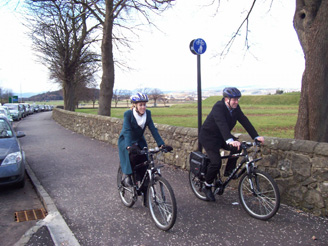Bikes are booked to individuals who require them for perhaps up to several hours at a time. Pool bikes are especially useful if the organisation has staff who regularly travel between two or more sites within a few miles of one another. Provided the organisation's insurance covers it, bikes can also be used at lunchtimes for leisure rides or for staff to get to local sandwich shops and other facilities.
Use of pool bikes could be linked to competitions and discounts at local shops and facilities.
Whilst they are still generally more expensive than ordinary bikes, the Travel Plan Coordinator might want to consider innovative ‘folding’ bikes or even 'electric bikes'.
Some questions to think about whilst considering a pool bike scheme:
- Would people be able to make use of the bikes? Do they currently make short business travel or other journeys which could be made by bike?
- How are journeys made at the moment and is there scope for any of these to change?
- Does your organisation have access to good cycling facilities, particularly off-road cycle routes?
- Have you got the space to store the bikes or can you make the space available?
- Do people need to take any material (files, laptops..etc) with them?
- As an organisation, there are a number of benefits to be gained from setting up a bike pool including reduced travel expenses and enhanced fitness and health of staff.
Typical barriers to the introduction and success of pool bikes are as follows:
- Fears for personal safety.
- Funding.
- Minimal interest in cycling in the organisation.
- Location in an area not felt to be suitable for cycling.
- Concerns over limited changing and showering facilities.
- Limited space to introduce bike storage.
- Concerns about insurance and liabilities.
Starting up a Pool Bike Scheme
The Travel Plan Coordinator should consider the following:
- Research the cost of introducing, supporting and maintaining the scheme including acquiring bikes and any other necessary safety equipment.
- Obviously you'll need to get senior management backing to the idea of a scheme.
- There are certain legal requirements that employers must fulfil in relation to providing bikes for workers. Employers must ensure that bikes are safe to ride; that riders are able to ride the bikes safely; that safety equipment is provided and maintained and that the individual employee and equipment is adequately insured. Talk to relevant management team members who deal with health and safety and the human resources issues.
- Consider cycle parking arrangements at your site.
- Contact suppliers of equipment and bikes.
- Set up system for managing the Bike Pool.
- Ensure that the scheme is effectively publicised.
Safety Issues and Insurance
It is recommended that the organisation provides the following in connection with a pool bike scheme:
- Cycle Training – It is always a good idea to ensure that those who are not regular cyclists receive adequate training before they begin using the scheme. As Travel Plan Coordinator, you may be able to get training from one of Cycling Scotland's accredited cycle trainers.
- Cycle Helmets – Although it isn’t a legal requirement to wear cycle helmets, it's recommended that they're provided so the cyclist can choose to wear one or not.
- High Visibility Clothing– Again, not a legal requirement but can be very effective, especially for riding in the dark.
- Bike Lights – All bikes must be fitted with a rear reflector and reflective strips on the back of each pedal. For those anticipating cycling at night, front and rear lights should be fitted as standard to comply with legal requirements.
- Bike Bells – Legally, when bikes are sold they should be fitted with a bell, although it is not a legal requirement for a cyclist to have a bell when riding the bike.
- Bike Locks - provide bike locks to ensure that bike can be securely locked when not in use.
Travel Plan Coordinators may also want to suggest that pool bike users look over the highway code to ensure they're fully conversant with how to cycle correctly and safely.
It is also worth considering having a test or trial session for the would-be pool bike user, to check that they are happy and competent using the bike before allowing them to register.
Insurance Implication of a Pool Bike Scheme
Legally, the organisation introducing the pool bike scheme should have Third Party Public Liability Insurance covering scheme users. Senior management should check all insurance documentation to ensure they have the necessary cover in place and that there are no exclusions affecting the policy.
It might be prudent to add theft insurance to the policy in order to cover the bikes and any associated equipment.
Individuals may want to take out personal accident insurance in case of injury. This will be down to the individual in question to do as they see fit.
Administering the scheme
Ideally, the scheme should be administered by a specific person who'll come to be seen as the ‘face of the scheme’. It’s important that the person is enthusiastic and has some knowledge and experience of cycling. Ideally, of course, it would be the Travel Plan Coordinator.
Depending on the size of the Coordinator's organisation and the number of participants, it may be worth setting up an intranet based booking system or a face to face system with the administrator who can subsequently log the reservation.
Feedback and monitoring is important to be able to analyse areas that need improvement (more bikes, bikes in different locations, different types of bikes..etc). Members should be made aware that the administrator can be contacted by phone or email with any feedback. The administrator should also actively seek to get members views on a regular basis.
Aside from monitoring the scheme’s performance, the administrator should be responsible for ensuring that the condition of all bikes is checked on a regular basis.
